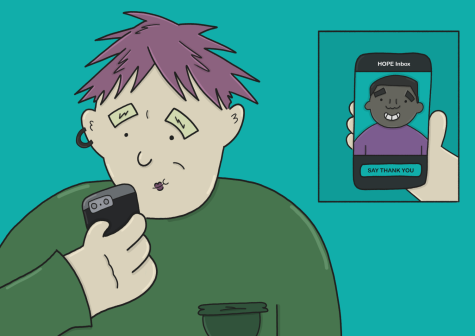STIGMA app created by Columbia team named ‘Best App for Good’ by Google Play
February 10, 2023

With 4.1 out of 5 stars on Google Play and over 1,000 downloads, the STIGMA app was named Google Play’s “Best App for Good” for 2022. STIGMA was created by Columbia students and faculty.
Founder Ariana Vargas created the app in 2021 to establish a space for users to share different mental health issues.
“Our vision for the future is to become the most trusted mental health destination in the world,” said Vargas, STIGMA’s chief executive officer.
STIGMA is a crowdsourcing app that allows users to share their own mental health stories and receive messages of hope from strangers. They can customize what they need, offer their own tips or resources or receive messages in their inbox. Messages can be video, voice or written.
Topics include miscarriage, ADHD, cancer, child sex abuse, loneliness, panic attacks and workplace trauma.
Last November, the company received an email with the news that STIGMA would be featured in Google Play’s “Best Apps of 2022,” Vargas said.
“When we got that email, I realized that when the world needs something badly enough, people will be okay with accepting hiccups and bugs and little things like that,” Vargas said.
According to the National Center for Biotechnology Information, 50% of lifetime mental illness starts at age 14, and by age 24, that rises to 75%.
Senior Duncan McDonald, a game design major, works for STIGMA to help with the mobile front-end of the app building screens that display the app’s data.
“It was a huge team effort and it couldn’t have come together without everybody, it’s definitely very rewarding and awesome,” McDonald said.
Bill Guschwan, associate professor in the Interactive Arts and Media Department, was impressed that an app made by Columbia students received an award against other professional companies.
“I think it sets a pretty high bar of excellence for other students who may want to achieve the same thing,” Guschwan said, who is now the chief technology officer of STIGMA.
Guschwan said joining the STIGMA team has encouraged him to speak about his own mental health more.
“I can sort of give back to others from my own experience,” Guschwan said. “I think it definitely informs my work with students because I can share with them, I’ve struggled in college with mental health, and let them know that it’s okay and you can be successful even with it.”
According to Vargas, STIGMA is focusing on gaining a bigger audience, specifically young people, so they can be educated about general mental health topics.
The STIGMA app will add a “resources” tab, Vargas said, which will feature vetted health and wellness providers to offer free care coordination services.
“The idea behind it is we want to give people a place where they feel like they can trust what they’re looking at,” Vargas said. “They can trust that if someone says they’re a clinician or a mental health professional, they are.”
The app is available on the Apple App Store and at the Google Play Store.







